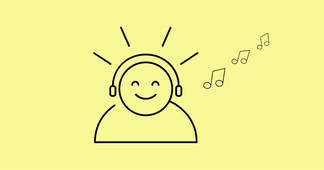|
July 31, 2020 / Source: The Bizz USA By Elizabeth Insuasti; Edited by Haarika Kalahasti and Pallavi Vemuri Have you ever felt down and thought that there was absolutely nothing that could better your mood? Then, a particular song plays, perhaps your childhood favorite, lifting your spirits. This behavior raises the question: is there a connection between music and mood? A hidden beauty lies inside the depths of music. In every lyric, melody, tune, and beat, music's harmony brings life when being played or listened to. Music is a great companion to many people, especially those suffering from depression, stress, and anxiety. Thanks to its therapeutic nature, music naturally improves the quality of life and is known to be a critical factor in improving one's happiness. Here are the reasons why music can improve happiness:
The neurological studies of music indicate why sometimes we interpret and react emotionally to a piece of music. One study in which babies, as young as five months old, responded to happy songs, and by the time the same babies were nine months, they were able to evoke sadness from sad songs [source: LiveScience]. Physiological states brought on by music only intensify as we grow. Happy music, usually featuring a fast tempo, can cause a person to breathe faster, a physical sign of happiness [source: Leutwyler]. Similarly, sad music, which tends to be in the minor keys and very slow, causes a slowing of the pulse and a rise in blood pressure. Music can make us feel uplifted, content, and play a role in improving our health. Whether you're performing or listening, music can uplift your spirits (as well as those around you.) As we listen, music works on the autonomic nervous system (responsible for controlling blood pressure and heartbeat) and the limbic system( responsible for feelings and emotions). In a review of 23 studies in 2009 by Bradt and Dileo, involving almost 1,500 people, they found music helped reduce blood pressure, heart rate, and anxiety in heart disease patients. TEST IT OUT: · Listen to music every day. Just twenty-five minutes every day for at least ten days will help with stress relief and possibly make you sleep better. Keep up the habit beyond ten days if you can. · Play music while working out. Experts from Hampden-Sydney College say that listening to music during exercise can help release endorphins to increase your endurance, boost mood, and distract you from the discomfort you may feel during your exercise session. · Pick music to suit the situation. Any type of classical music, such as pieces by Mozart or Beethoven, can help relieve muscle pain. For a practical, beneficial workout, researchers say the best music is high-energy, high-tempo music such as hip hop or dance. · Listen to music while working or studying. If you're trying hard to crack that difficult report or struggling with the final touches of a final project, music could help get your brain in gear.
1 Comment
Anonymous
7/31/2020 06:27:58 pm
Great information! Will definitely test these out!
Reply
Leave a Reply. |
Our WritersHaarika Kalahasti Archives
September 2021
Categories |


 RSS Feed
RSS Feed